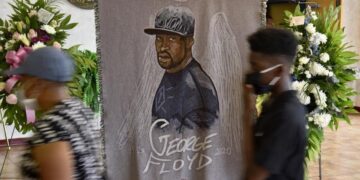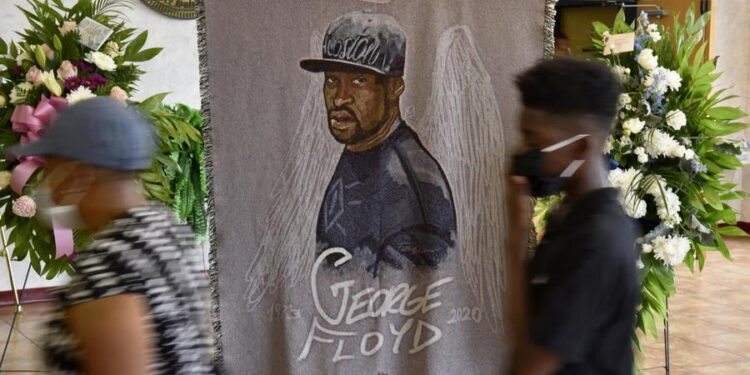The sun sets over Minneapolis on May 25, 2020. The streets are still. George Floyd, 46, enters Cup Foods, a familiar corner store. He buys a pack of cigarettes and hands over a $20 bill.
The clerk glances at it suspiciously, suspecting it might be counterfeit. He calls the police, unwittingly setting off a sequence of events that will resonate around the world.
Minutes later, officers Thomas Lane and J. Alexander Kueng arrive. Floyd is seated in an SUV. Lane taps the window with his flashlight, causing Floyd to flinch. He raises his hands, but Lane draws his weapon. Moments later, they pull Floyd from the vehicle and handcuff him. Why? Because he is Black.
George remains calm, yet anxious. “I’m claustrophobic,” he pleads. “Don’t put me in the squad car. I can’t breathe.” He asks to lie down on the ground.
The Knee on the Neck
Officer Derek Chauvin arrives. At 44, he has 19 years of experience and poses no questions. Instead, he kneels on Floyd’s neck, an act driven by his own cruelty. Floyd, already handcuffed and face-down, is not resisting.
Time ticks by.
“I can’t breathe,” Floyd gasps. “Please… Don’t kill me.” His pleas are captured in videos taken by witnesses. Darnella Frazier, then 17, records the scene that becomes iconic: a man pinned to the ground beneath a police officer’s knee. Floyd cries out, “Mama… Mama… Tell my kids I love them.”
Later, Darnella testifies: “I felt I had to protect him. But I was just a kid. I couldn’t do anything except record.”
No Pulse
A bystander urges the officers, “He’s not resisting! Look, he’s not breathing! Get your knee off his neck.” Chauvin remains unmoved, staring ahead, nearly indifferent.
Floyd falls silent. His mouth hangs open. His skin darkens.
Kueng checks for a pulse. “No pulse,” he states. No one takes action. Chauvin continues to press down.
Eight minutes and forty-six seconds go by. George Floyd is gone.
When the ambulance finally arrives, it’s too late. He is pronounced dead in the hospital at 9:25 p.m.
“I Can’t Breathe”: A Cry That Resounded Globally
The official police report claims, “The suspect suffered a medical incident.” It omits mention of the knee or suffocation. However, Darnella’s video spreads rapidly, embedding Floyd’s cries into the collective consciousness of millions.
Protests erupt across Minneapolis. The phrase “I can’t breathe” becomes ubiquitous. Within days, over 2,000 cities in the U.S. join in the outcry—from Los Angeles to New York, and even in Paris and Melbourne.
Globally, millions rally against racism and police violence, lying down on streets for 8 minutes and 46 seconds—commemorating Floyd’s final moments.
The Verdict
On May 29, Derek Chauvin is arrested and charged with second- and third-degree murder, making him the first officer in Minnesota to face murder charges for killing a Black man. In April 2021, a jury convicts him, leading to a 22.5-year prison sentence. He later pleads guilty to federal charges for violating Floyd’s civil rights, receiving an additional 21 years.
The other three officers—Kueng, Lane, and Thao—are found guilty for failing to intervene and for their roles in the crime. They receive prison sentences ranging from 2.5 to 4.75 years.
The City of Minneapolis agrees to pay Floyd’s family $27 million. Their attorney, Ben Crump, remarks: “This was the killing the world had to witness to finally believe.”
Fighting for Breath
On June 4, 2020, Minneapolis holds a public memorial for George Floyd. Reverend Al Sharpton states: “For 8 minutes and 46 seconds, this man begged for breath. And we’ve been fighting for ours for 400 years.”
The Floyd case ignites not only outrage but also calls for change. States begin revising police use-of-force policies, while institutions globally start tracking police violence, inequality, and systemic oppression.
The World Can’t Say It Didn’t Know
Yet, change in America is slow. Despite reforms, the issues persist. Activist Johnetta Elzie of Black Lives Matter poignantly notes: “Floyd’s murder wasn’t the first. But it was the clearest. The world can’t claim ignorance anymore.”
George Floyd is laid to rest in Houston, with mourners shedding tears in farewell. His name appears on walls, pavement, and forever in history.
His final words, echoed endlessly before he passed, resonate as the cry of a generation:
“I can’t breathe.”

















